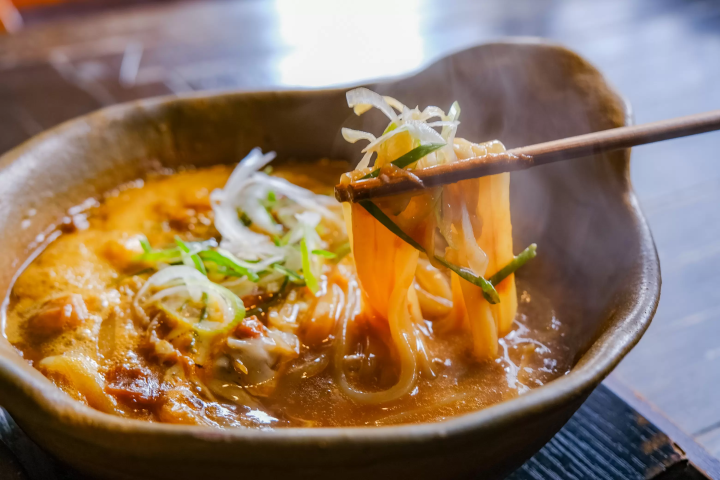Onsen in Tokyo: Hotels, Spa, and Nearby Hot Spring Towns

Learn the best hotels and spa facilities in Tokyo that offer onsen (hot springs) for relaxation and wellness, as well as private onsen and onsen towns near Tokyo.
Onsen in Tokyo: Enjoy Hot Springs in Japan's Capital
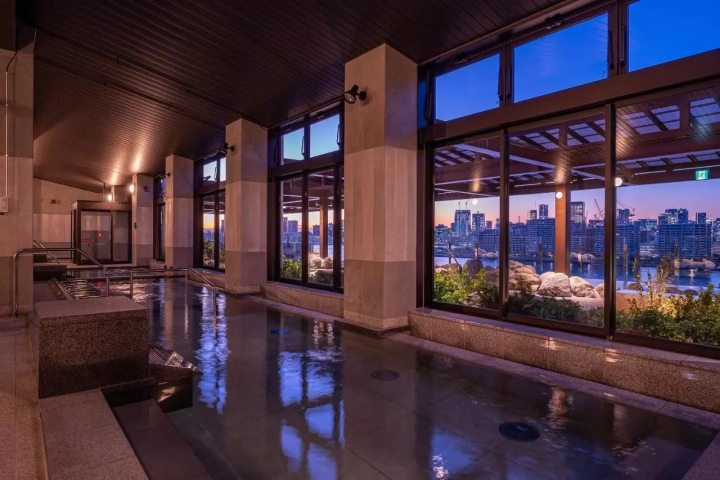
The hot spring facility at Tokyo Toyosu Manyo Club. Picture courtesy of Booking.com
Onsen, or hot springs, are plentiful in Japan due to the country's volcanic landscape. Since ancient times, hot springs have been valued for their health benefits and relaxing effects, with renowned hot spring towns like Arima Onsen and Beppu Onsen enjoying popularity for centuries.
In Tokyo, you can experience hot spring baths at spa facilities within hotels, as well as at "day-trip spa facilities" or super sento (large public baths), where visitors can enjoy baths, saunas, or massages.
It's important to note that not all hotels with large communal bathing areas offer hot springs; many simply use heated water. If you are specifically seeking hot springs, be sure to check the official website of the facility.
Additionally, there are hot spring towns near Tokyo, such as Atami Onsen and Hakone Onsen, where you can stay at a Japanese inn (ryokan) that features private onsens in the guest rooms.
Onsen vs Sento: Difference Between Hot Springs and Public Bathhouses
Onsen refers to hot springs in Japanese, while "sento" is the name for public bathhouses. The main difference between them is the water source.
An onsen facility uses natural hot spring water, while sento uses heated tap water, leading to great differences in ambiance, health benefits, and cultural significance.
If you're seeking health benefits, go to a spa facility with natural hot springs. While there aren't many such facilities in Tokyo, we introduce a selection below.
If all you want is to experience public bathing in Japan, a tradition that goes back to the time when not all residents could afford to have a bathtub in their homes, then try looking for a sento (public bathhouse).
For Wellness and Health Benefits: Onsen (Hot Springs)
Onsen refers to hot springs that are sourced from geothermally heated natural mineral water. They are typically found in volcanic regions and are believed to have therapeutic properties due to their mineral content.
Onsen facilities often provide a more natural experience, with outdoor baths (rotenburo) that allow bathers to enjoy scenic views. Many ryokan (traditional inns) located in hot spring towns offer onsen baths, and even the hot water in guest rooms is usually from onsen.
Associated with relaxation and wellness, onsen culture is deeply rooted in Japanese tradition. It is common for visitors to travel specifically to onsen towns for a spa-like experience.
Those who seek hot spring baths should look for the term 天然温泉 (tennen onsen), which means "natural hot spring water."
To Clean Your Body: Sento (Public Bathhouses)
Sento, on the other hand, is a public bathhouse that uses regular tap water which is heated for bathing purposes. Sento does not utilize natural hot spring water.
Public bathhouses in Japan focus on providing a space for people to wash and relax. The fees at sento bathhouses in Tokyo are fixed at 550 yen for adults and 200 yen for children.
Sento serve as community bathhouses, mainly for locals, and can be seen as part of daily life in urban areas. Many Japanese residents who grew up in times when it wasn't usual for homes to be provided with bathtubs still enjoy going to the sento. For this reason, public bathhouses also serve as spaces for socialization.
In recent years, there has been an increase in "super sento," which are facilities that feature multiple bathing areas, saunas, and relaxation rooms. Many of these super sento also include hot spring baths. They operate as spa facilities, with fees varying based on the specific location.
Hotels with Onsen in Tokyo
Below, we present a selection of hotels in Tokyo that feature spa facilities with natural hot springs. By staying at these hotels, you can enjoy the health benefits of hot springs without leaving the city.
1. Tokyo Toyosu Manyo Club
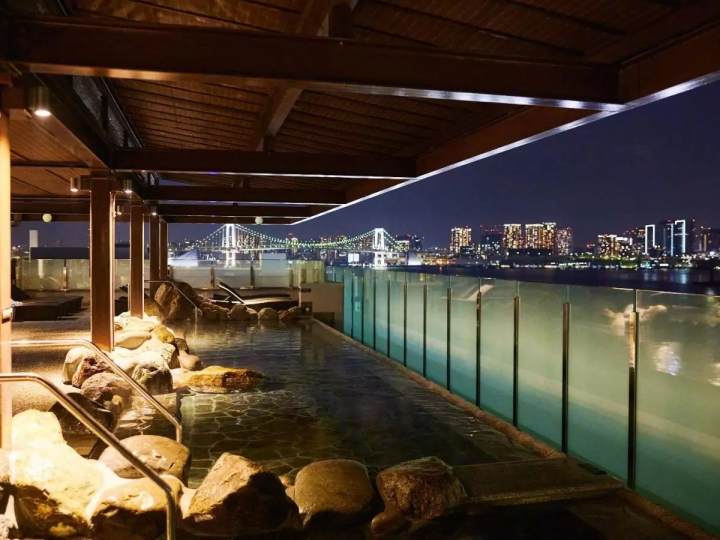
Tokyo Toyosu Manyo Club is a hot spring-themed hotel that offers guests the opportunity to enjoy hot spring baths, saunas, and open-air baths. The spa and wellness center also provides a range of massage and wellness packages.
The hot springs provided at Tokyo Toyosu Manyo Club are sourced from Hakone and Yugawara, which are renowned hot springs near Tokyo.
The spa facility can also be used by non-staying guests.
2. Hotel Chinzanso Tokyo
Hotel Chinzanso Tokyo features hot spring baths at its award-winning spa, YU, THE SPA, which is accessible to both guests and non-guests. The facility includes an indoor pool, a fitness gym, and options for beauty treatments and rejuvenating massages.
The hot spring water at YU, THE SPA is sourced from Ito, a renowned hot spring resort in Shizuoka. The spring water from Ito is known for its mild alkaline and saline properties, which are believed to provide beautifying effects, enhance blood circulation, and alleviate rheumatic pain.
3. Villa Fontaine Grand Tokyo Ariake
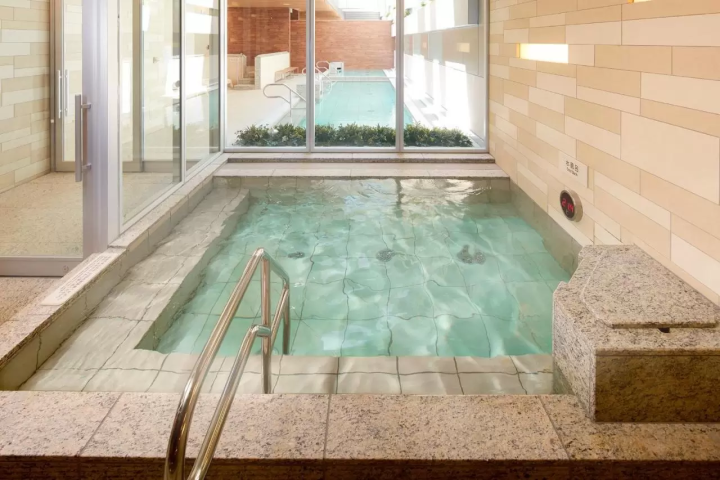
Picture courtesy of Booking.com
Villa Fontaine Grand Tokyo Ariake is a 4-star hotel located near Odaiba, Tokyo's vibrant amusement district.
The hotel's spa facility, Izumi Tenku no Yu Ariake Garden, offers eight different types of baths, saunas, and beauty salons, including an open-air bath where you can enjoy natural hot spring water sourced from 1,500 meters underground.
The hot springs at this facility are iodine sodium chloride salts, classified as strong salt springs. Due to the high salt concentration, the effects may vary depending on the user's skin type and constitution.
4. Tennen Onsen Hojo no Yu Dormy Inn Ikebukuro
Dormy Inn is a chain of business hotels that provides stylish and functional rooms at affordable prices, along with a public bath for guests to enjoy.
In Tokyo, we recommend Dormy Inn Ikebukuro, situated in the vibrant Ikebukuro district, which offers numerous shopping options and excellent transportation connections.
The public bath at Dormy Inn Ikebukuro features natural hot springs and includes a sauna for added relaxation.
5. La Vista Tokyo Bay

Picture courtesy of Booking.com
La Vista Tokyo Bay is situated in the Toyosu district of Tokyo, conveniently close to attractions such as teamLab Planets and Toyosu Market. The hotel features stylish rooms that offer stunning ocean views.
The spa facility includes natural hot springs, an open-air bath, and a sauna, providing guests with a relaxing experience. This hotel is a great choice if you want to enjoy a hot spring infinity pool with beautiful views of Tokyo Bay.
Foreigner-Friendly Onsen Facilities in Tokyo
Next, we introduce foreigner-friendly spa facilities and super sento with hot springs that do not provide lodging. These facilities are designed for short visits—typically two to three hours—where you can enjoy a hot spring bath, massage, or sauna.
They provide dryers, towels, and amenities, allowing customers to visit without bringing anything.
To use these spa facilities, simply purchase a ticket at the reception that specifies the type of bath or treatment you wish to enjoy. Prices vary depending on the number of facilities you plan to use.
We recommend checking the official websites of these facilities to confirm their policies regarding customers with tattoos. For a list of tattoo-friendly spa options in Tokyo, please refer to the end of this article.
1. Spa LaQua - Tokyo Dome City
Spa LaQua is an urban spa resort located adjacent to Tokyo Dome. In addition to its abundant natural hot springs, the facility features rock baths, sauna facilities, a variety of treatments, restaurants, and cafes, as well as relaxation areas and more.
Please note that visitors with tattoos cannot use the facilities at Spa LaQua.
Spa LaQua
Location: Map
Business hours: 11:00 - Next day 9:00
Website: https://en.www.laqua.jp/spa/
2. Times SPA RESTA in Ikebukuro
Times SPA RESTA in Ikebukuro is situated directly across from the Sunshine City complex in Tokyo's Ikebukuro district.
The facility features a variety of hot spring baths, including water infused with carbon dioxide, which improves blood circulation and supports skincare. Guests can also enjoy an open-air bath that allows them to soak up abundant sunlight and gentle breezes, as well as a massage bath that provides moderate pressure to help relieve tension and fatigue.
Additionally, Times SPA RESTA offers a range of relaxation massages, body treatments, and aromatherapy. The general fee for using the facility is 3,150 yen.
Times SPA RESTA in Ikebukuro
Location: Map
Business hours: 11:00 - Next day 8:30 *Sundays and holidays: 11:00 - 22:30
Website: http://www.timesspa-resta.jp/facility/ (Japanese)
3. Thermae Yu in Shinjuku
Thermae Yu is an onsen facility that operates 24 hours, 365 days a year. Located in Tokyo's Shinjuku district, this spa facility has the concept of "soothing the senses in the heart of the city."
They offer a diverse selection of onsen baths, featuring hot spring water sourced from the Izu Peninsula. The natural hot spring water is carefully heated, cooled, circulated, filtered, and disinfected to maintain its high quality.
The facilities include an open-air bath and skin-beautifying lotion baths. The soft water, known as the "beauty bath," is renowned for its moisturizing properties that promote healthy, radiant skin.
Thermae Yu is a tattoo-friendly spa facility. Visitors are kindly asked to cover their tattoos with special stickers that they can purchase at the reception; you will be required to show your passport to prove that you're a visitor from abroad.
Thermae Yu
Location: Map
Business hours: open 24 hours
Website: https://thermae-yu.jp/spa-sauna/
4. Asakusa ROX Matsuri Yu
Asakusa ROX Matsuri Yu is a hot spring and spa facility situated in the historical area of Asakusa, Tokyo, which is home to Sensoji Temple.
The facility offers 11 types of baths, including open-air baths with views of the Skytree and a variety of indoor baths. Visitors can also enjoy aesthetic treatments, saunas, and a range of amusement games.
While visitors with tattoos are welcome to use the facility, they are kindly requested to cover their tattoos and body art with stickers before entering. Stickers are available at the front desk.
Asakusa ROX Matsuri Yu
Location: Map
Business hours:
Monday to Saturday: 10:30 - 9:00 next day (*the large bath closes at 8:00 AM the next day)
Sunday: 10:30 - 23:00 (*the large bath closes at 22:30)
Website: https://www.matsuri-yu.com/en/
Tattoo-Friendly Onsen and Spa Facilities in Tokyo
Visitors with tattoos can enjoy hot spring baths at tattoo-friendly facilities like Thermae Yu in Shinjuku or Asakusa ROX Matsuri Yu.
Please note, however, that you are required to cover your body art with tattoo seals or special stickers, which you can buy at the reception of the spa facility.
These restrictions are rooted in the historical association of tattoos in Japan with gangs and anti-social behavior. Using tattoo covers can help you avoid curious looks from elderly locals.
Onsen Towns near Tokyo
Some hot spring towns can be accessed in less than two hours from Tokyo. We recommend visiting an onsen town for the authentic hot spring experience, enhanced by the beautiful natural scenery of the area and local cuisine.
Hakone Onsen
Located about 80 kilometers from Tokyo, Hakone is famous for its beautiful natural scenery, hot springs, and views of Mount Fuji.
The area offers a variety of onsen resorts and traditional ryokan (inns), making it a popular destination for both relaxation and outdoor activities.
Read also
Atami Onsen
Situated along the coast about 100 kilometers from Tokyo, in the Izu Peninsula, Atami is known for its hot springs and seaside attractions.
It features numerous ryokan and public baths, as well as beaches, scenic views, and a lively atmosphere.
Read also
Kusatsu Onsen
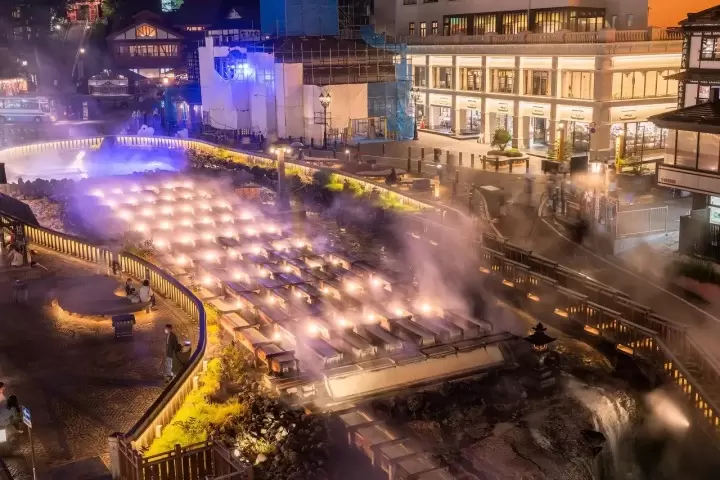
Photo by Pixta
While a bit further away (approximately 200 kilometers from Tokyo), Kusatsu is renowned for its high-quality sulfuric hot springs.
The town features a distinctive yubatake (hot water field) in the center and offers a variety of bathhouses and outdoor baths, making it a popular destination for relaxation and health benefits.
Enjoy Onsen in Tokyo and Nearby Hot Spring Towns
We hope the information provided above encourages you to explore Japan's hot spring culture in Tokyo and its surroundings. An onsen bath offers refreshing and rejuvenating benefits that can enhance your wellness, making this experience a must-try.
Read also
Main image courtesy of Booking.com
Ramona, English content editor at MATCHA since 2016, has been practicing ikebana flower arrangement (Ikenobo School) and tea ceremony (Omote Senke) since 2012. She arrived in Japan in 2012 as a graduate student with a focus on Japanese literature and performing arts. As a travel editor and writer, Ramona has visited and documented 40 of Japan's prefectures with a focus on art, history, traditional Japanese crafts, and performing arts.































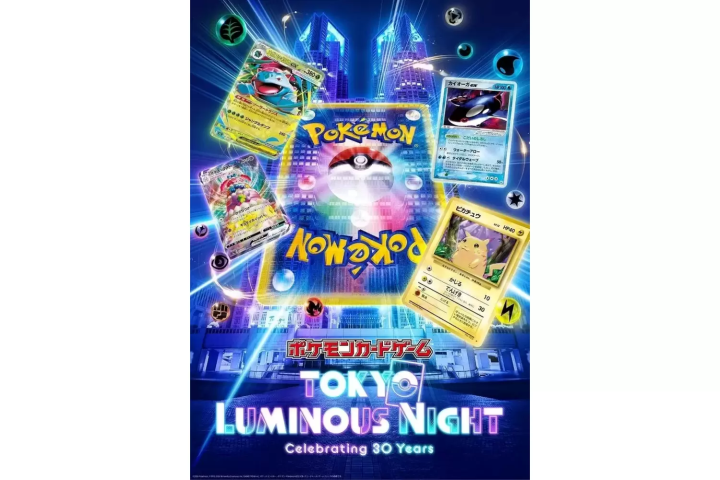










![[To Kanazawa, one of the most beautiful stations in the world] How to get to the hotel from Tokyo, Nagoya, and Osaka](https://resources.matcha-jp.com/resize/720x2000/2024/03/31-175788.webp)
![[2 hours from Tokyo ] A relaxing 1-nigh, 2-days trip to Hokuto City by train](https://resources.matcha-jp.com/resize/720x2000/2026/02/25-259638.webp)
![[Hans Gate Shop] Hans Castle Festival](https://resources.matcha-jp.com/resize/720x2000/2026/02/25-259626.webp)
